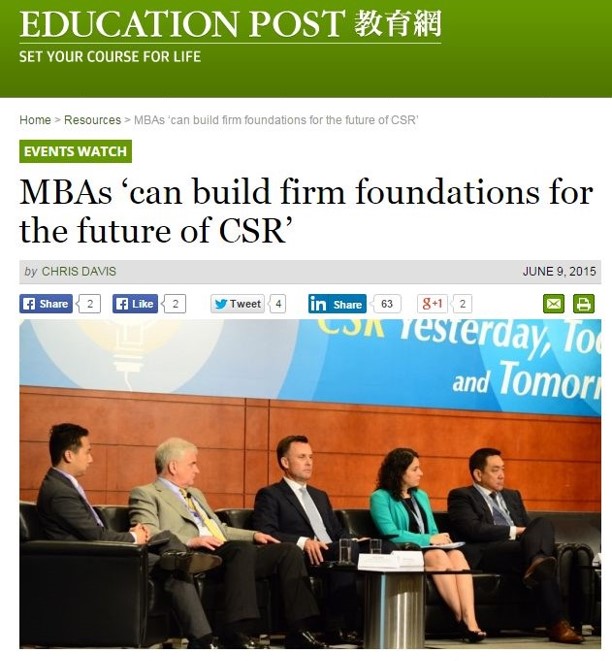Professionals equipped with an MBA – and MBA students – have an important role to play as corporate social responsibility (CSR) initiatives continue to gain momentum across business sectors. The various ways that MBA holders and students can apply a socially responsible mindset in their employment responsibilities was a recurring message from keynote speakers and presenters at the ninth annual Chinese University (CUHK) business school MBA CSR conference.
Under the theme of “CSR Yesterday, Today and Tomorrow’’, presenters and panellists from large corporations, small enterprises, not-for-profit and non-government organisations (NGOs) outlined to conference attendees how they implement their own CSR endeavours, and suggested ways to carry out CSR activities. Keynote speaker Seema Aziz, founder and chairperson, CARE Foundation, Pakistan’s largest non-government organisation, outlined how the foundation educates more than 180,000 students in over 350 schools. Another keynote speaker, Philippe Lacamp, Swire Pacific’s global head of sustainable development, explained the steps being taken to reduce the organisation’s overall environmental impact and improve energy efficiency.
The one-day conference also featured panel discussions involving CSR professionals, entrepreneurs, academics and business managers who talked about the role of CSR in compliance, risk management, information disclosure and the various ways entrepreneurs can create social value. Another key feature was the presentation and judging of the CUHK MBA and Swire Pacific CSR Case Competition, requiring teams to provide solutions to real issues that have an impact on Swire’s own CSR initiatives. The three finalist teams were evaluated on their knowledge, innovation, scalability, and most importantly, the impact of their solutions.
Metha Watcharaumnuay, president of the CUHK MBA CSR Committee 2015, believes Asia’s largest not-for-profit CSR conference is a high-profile forum for information sharing, discussions and networking. For example, Watcharaumnuay says learning how different companies approach CSR issues provides conference attendees, and in particular MBA students, with a wide range of important perspectives. Based on the concept of how CUHK’s MBA programme can give something back to the community students study in, since the 2007 initial conference the CUHK MBA organising committee have continually strived to make the event relevant and practical.
Highlighting the linkage between MBA programmes and the application of CSR practices in the workplace, keynote speaker Patrick Riley, senior vice-president with Interface Asia-Pacific, one of the world’s leading modular floor coverings companies, told his audience that for CSR strategies to really work, it comes down to people, passion, commitment and leadership. “It is people being fully engaged in what they are doing that drives sustainability and CSR objectives,”, Riley says, adding that individuals with MBA qualifications are often in a management position or moving closer to being involved in making business decisions that include CSR strategies.
Citing examples of Interface’s sustainability initiatives, which Riley says have saved the company substantial sums of money, he emphasises the importance of measuring and evaluating the effectiveness of CSR and sustainability activities. He also stressed the importance of monitoring CSR and sustainability practices across the entire supply chain. “Businesses are frequently able to define what they believe are good CSR practices, which is often a case of what is most convenient to them, but doesn’t always include what happens along the supply chain,’’ Riley notes. He adds that while there are inevitably pitfalls in any CSR strategy, good practices require dealing with both comfortable and uncomfortable situations and outcomes.
During a panel discussion focusing on “corporate social responsibility across the value chain as a new form of risk management’’, Mara Chiorean, executive director, CSR Asia, an organisation that provides consultancy, research, advisory and training services, revealed how companies in Hong Kong and the around the Asia-Pacific region can work together to create inclusive and sustainable shared value chains. “There are plenty of new business models that address social and environmental issues in a practical and commercially viable way,’’ Chiorean says.
Panel moderator Patrik Sandain, co-founder and director of The Natural Step, an international not-for-profit enterprise that uses science-based frameworks to drive sustainable innovation, outlined the various risks enterprises face including extreme weather, regulatory, labour and reputation disruption in manufacturing and distribution. “Business can’t avoid risks, but having well-planned sustainability and CSR frameworks in place, can help to mitigate them,’’ Sandain says.
Following a survey and discussions, panel member, Calvin Lee Kwan, general manager sustainability at The Link Management, explained how through engaging with stakeholders, The Link Management can exchange knowledge and expertise. “Many of our stakeholders are specialists in certain areas such as waste recycling, so we can benefit from their knowledge and experience,’’ Kwan says.
Craig Shute, senior managing director Hong Kong, Macau and Taiwan for property services firm CBRE, points out how being active in CSR not only helps to create sustainable environments to live and work in, but also makes good business sense. “Having robust CSR policies gives our clients and investors confidence while helping us to attract and retain the best talent,’’ says Shute, pointing out that younger people joining the workforce are reluctant to work for companies which are not serious about their CSR and sustainability responsibilities.
Librian Angraeni, Environmental and Social Footprint Manager of Asia Pulp & Paper (APP), told conference participants that as one of the world’s largest pulp and paper companies, her company has made several firm commitments to protection of the environmental and the welfare of local communities. For instance, The cornerstone of these commitments is the company’s Forest Conservation Policy, which the company announced in 2013 an end to prohibit the clearing of natural forest across its entire supply chain in Indonesia and to implement best practice in forest management. “APP has long been committed to supporting the rights of communities in and around our operations, and those of our suppliers,’’ says Angraeni, who is also chairperson of the Indonesia Water Mandate Working Group operating under the United Nations CEO Water Mandate.
Motivated by the needs of a parent, Doris Leung, CEO of Diamond Cab, gave an uplifting personal presentation describing how her love and care for her wheelchair-bound mother prompted her to set up her company. Offering point-to-point transportation services for wheelchair users, it operates a small but growing fleet of specially designed Toyota Noah Welcab taxis, which have completed more than 76,500 taxi journeys since Leung set up the enterprise in 2007. “With the spirit of entrepreneurship and determination, Diamond Cab is a good example of how social needs can be turned into an economic incentive to provide a community benefit,” Leung told the conference.
Home > News & Events > News Detail
2015-06-09
MBAs can build firm foundations for the future of CSR


